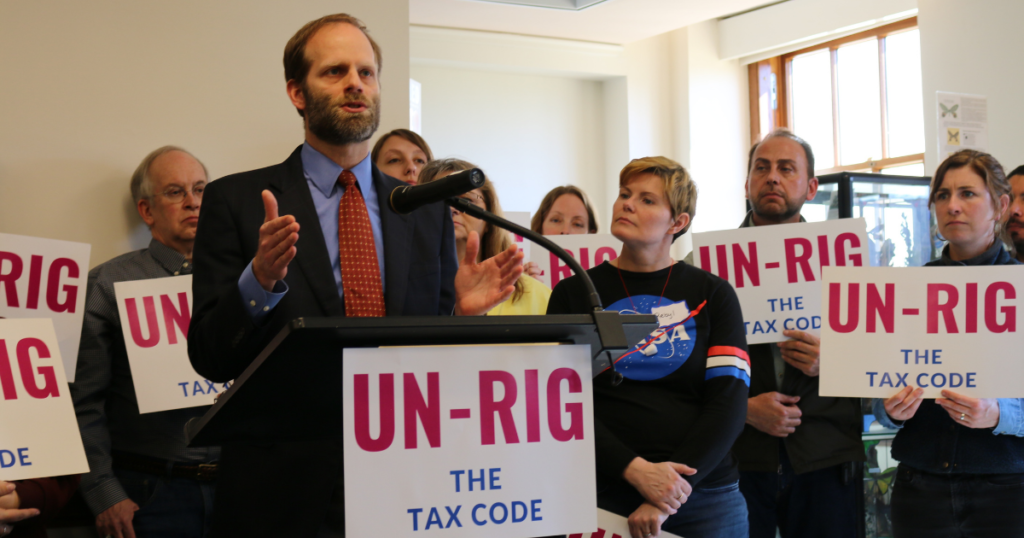Last week, the Legislature took a positive step toward tax fairness by closing a loophole in Maine’s tax code that gives corporations a tax break based on their foreign sales.
As part of the Supplemental Budget, lawmakers eliminated a wasteful and ineffective tax break known as the Foreign Derived Intangible Income deduction, or FDII. The move saved Maine roughly $8.6 million in annual revenue — money that can now be used for job-boosting public investments, rather than lining the pockets of multi-national corporations.
FDII was created as part of the Trump Tax Cuts in 2017. It gives a lower effective tax rate to profits from foreign sales by US-based corporations. Its proponents claimed it would curb offshore tax haven abuse — the practice of hiding profits overseas to avoid taxes.
In reality, it created a new opportunity for corporations to game the tax system by rewarding companies for moving investments overseas. Research from leading experts has found FDII promotes tax avoidance and is ineffective at stemming tax haven abuse.1
Gov. Janet Mills deserves much of the credit for this victory for tax fairness. She included the elimination of FDII in her supplemental budget proposal. In testimony, Gov. Mills’ administration expressed skepticism about the deduction, and said there was no reason for Maine to replicate the federal tax cut.2
Still, Republicans in the Legislature fought tooth and nail to protect this wasteful tax cut for multi-national corporations. In the end, though, supporters of FDII could not defend the loophole’s excesses or offer any proof that the tax credit incentivized economic activity in Maine — especially after Maine Revenue Services revealed that of the 225 corporations that claimed FDII on their Maine Income Taxes in 2018, only 10 had Maine addresses.3
Maine still has a long way to go to roll back wasteful tax cuts and raise the revenue we need to address long-unmet needs with public investments that ensure all Maine families can thrive — things like education, health care, and infrastructure. Lawmakers will have ample opportunity this year to improve tax fairness and raise needed revenue, including by taxing capital gains and dividends, raising the tax on corporate profits above $3.5 million, restoring Maine’s tax on multi-million dollar estates, and raising taxes on the highest incomes.
But this small victory is a good first step; It shows that policymakers can reject the austerity mindset that prioritizes corporate profits and low taxes for the wealthy at the expense of shared opportunity and prosperity for all Mainers.
Notes:
1 Some examples include: Kamin, David et al. “The Games They Will Play: Tax Games, Roadblocks, and Glitches Under the 2017 Tax Legislation.” December 28, 2017. https://papers.ssrn.com/sol3/papers.cfm?abstract_id=3089423; Dharmapala, Dhammika. “The Consequences of the TCJA’s International Provisions: Lessons from Existing Research.” August 2018 https://papers.ssrn.com/sol3/papers.cfm?abstract_id=3212072; Shay, Stephen. “The US International Tax Reforms: Competitions and Convergence, Pay-offs and Policy Failures. 2018. Intertax, 46(11). https://papers.ssrn.com/sol3/papers.cfm?abstract_id=3297724; Avi-Yonah, Reuven S. “The International Provisions of the TCJA: Six Results After Six Months.” August 2018. Public Law and Legal Theory Research Paper Series. https://papers.ssrn.com/sol3/papers.cfm?abstract_id=3242008
2 Figueroa, Kristen. “Testimony of Kristen LC Figueroa, Commissioner Department of Administrative and Financial Services.” January 25, 2021. pp12. https://legislature.maine.gov/doc/5059
3 Memo from Maine Revenue Services distributed to lawmakers at the request of Senate President Troy Jackson. Obtained March 10, 2021.




